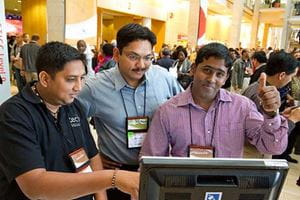
COLORADO SPRINGS, Colo. – The founder of a technologies services firm is challenging fellow Christians in the business community to reconsider how they think about wealth creation from an evangelism perspective.
Joseph Vijayam, a proponent of the Business as Mission movement, is urging other Christians in business, to think about their own material gain from a biblical perspective, using it to boldly build God’s Kingdom.
“When conducting Business as Mission, the primary purpose has to be to expand the Kingdom of God,” said Vijayam, founder and managing director of Olive Technology, a Colorado Springs-based information technology services provider. “Profits and an increase of shareholder wealth are an important result of a solid business that is well executed and are essential for the survival of any business, but they need not become the very purpose for existence.”
Owners and managers of Business as Mission enterprises, such as Olive Technologies, use business as a force for good. They use profits holistically to also address the spiritual needs of employees, clients and the community, as well as social, economic and environmental needs. Sometimes this objective defies conventional wisdom.
Vijayam recounts an instance in which Olive’s accountant, an orthodox Hindu, fell ill with what appeared to be incurable liver disease: Rather than replace him, he would wait, appeal to his management and staff for prayer, and have the company pay in part for his treatment. Despite initial improvement, the accountant died. Was it worth it?
“We made an investment in Kingdom values that the company could afford, and we left the results to time and to God,” said Vijayam.
Since the Apostle Paul and his associates manufactured tents to support their ministry, Business as Mission has been a model for ministry. The most recent movement dates back to 2004, when the Lausanne Forum for World Evangelization addressed the role of businesses in mission work, particularly in countries hostile to missionaries. The concept is now integrated into networking operations, books and academic programs at major Christian universities.
Vijayam, who writes about Business as Mission in his blog “Ministry Platforms ," is himself from a long line of tentmakers. His grandfather and father both served the church in India as they worked as a furniture maker and geologist, respectively.
The Business as Mission movement’s influence is felt in the U.S. beyond the books and the networking groups. Vijayam recalls a colleague who left his job at a major U.S. corporation to start a Business as Mission company, because he felt limited in his ability to share his faith.
Vijayam sees rapid growth of Business as Mission companies overseas, particularly in regions that are hostile to Christianity and where missions are difficult to operate. He also sees more examples of non-Christians being exposed to the gospel through such companies.
“There are times when people came back and said to me, ‘You’ve honored your word,’ or ‘You haven’t charged us in interest when we were unable to make a payment on time,’” Vijayam said. “I can testify that making choices in favor of Kingdom principles ultimately pays.”
Olive Technology, based in Colorado Springs, is an information technology services organization providing full-service solutions in software development and process management in a diverse industry environment. Olive was formed with the expressed purpose to better serve clients with effective alternatives to traditional IT services by leveraging global resources, talent and technology. Since its inception in 1996, it has provided comprehensive technology services to more than 100 clients in 10 countries.

